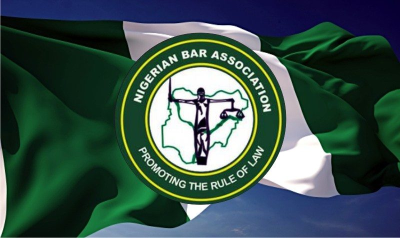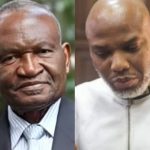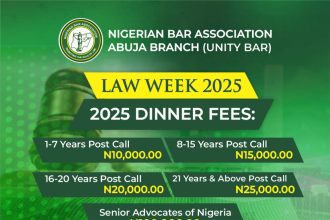The President of the Nigerian Bar Association (NBA), Afam Osigwe (SAN), has dismissed arguments supporting the suspension of Governor Siminalayi Fubara, his deputy, and House of Assembly members by President Bola Tinubu.
Naija News reported that the House of Representatives and the Senate, on Thursday, using voice votes, upheld President Tinubu’s declaration of a state of emergency in Rivers State. The federal lawmakers also upheld the suspension of Governor Fubara, his deputy, and members of the House of Assembly.

- Paul Harris Ogbole, SAN Appointed Chairman of the NBA-SLP 2025 CPC
- NBA Urges All Stakeholders Of The FG, to Comply With The Remuneration Order
- Register Today: https://www.nbaslp.org/conference as seats are limited.
In an interview with Arise News, Osigwe argued that the Nigerian Constitution is clear on how a sitting governor can be removed. He emphasized that even if intelligence reports informed the President’s decision to declare a state of emergency, such actions must align with constitutional provisions.

According to Osigwe:
“Sometimes in intelligence gathering, gossip can also amount to intelligence gathering. And I’m talking about empirically provable things to show a correlation. And time should have aided us in finding this. I concede that there may be intelligence not available to the public. But let’s for a moment think that intelligence was right. Has it met the constitutional threshold for the declaration of a state of emergency? I still think not. We haven’t.”
Osigwe further asserted that there is no ambiguity regarding the removal of a sitting governor under the Nigerian Constitution. He cited Section 188, which outlines the conditions under which a governor may cease to hold office, and noted that a state of emergency is not one of them. He criticized arguments suggesting that suspension is distinct from removal, stating:
“When you’re being suspended, your occupancy of that office for that moment is terminated. You can’t perform it. It’s a removal. It may be short-lived, but it’s a removal. And for any person to argue otherwise would amount to standing logic on its head.”

Osigwe also referenced Section 11 of the Constitution, which details the powers of the National Assembly during a state of emergency. He pointed out that the removal of a governor is not contemplated under this provision.
“If you also go to Section 11 of the Constitution, as to what could be done when a state of emergency is declared, it also shows you that the removal of a governor under Section 11(4) is not one of the things contemplated. So there’s no gray area.”
He went on to highlight the potential dangers of using a state of emergency as a pretext for removing elected officials, warning that such a precedent could lead to authoritarian rule.
“The emergency simply means that the President may take extraordinary measures to resolve the issue. It is the mode of intervention. It is not to dismantle democratic bodies or persons who have been duly elected into office. Otherwise, a President can turn into a dictator overnight and, at every whim or provocation, declare a state of emergency.”
Osigwe’s remarks have further intensified debates on the legality of the President’s actions in Rivers State, as legal scholars and political stakeholders continue to weigh in on the implications of the suspension of elected officials under a state of emergency.
NBA & PBDC Launch Leadership Course on Criminal Justice and Human Rights











